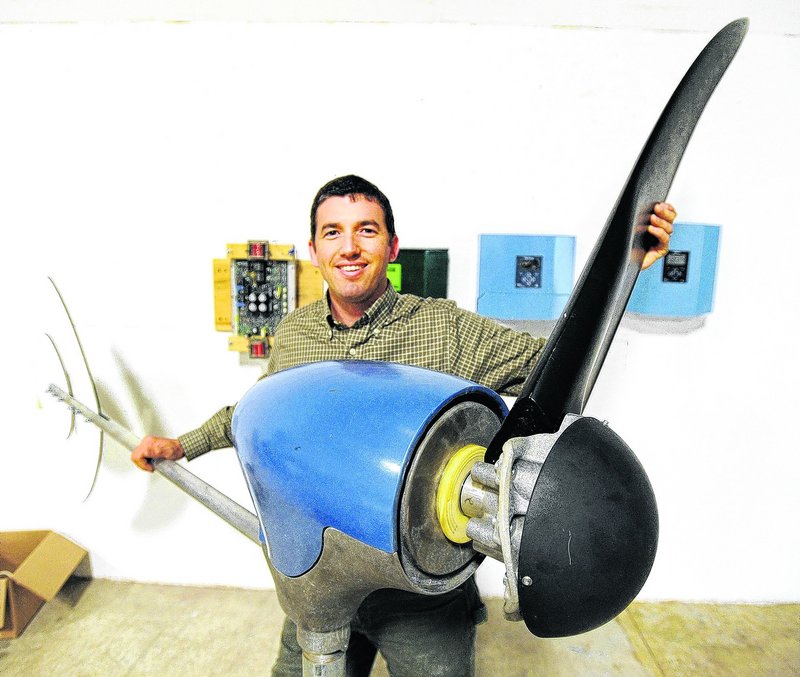Maine Angels’ $9.7 million in investments over 10 years has yet to produce a return, but that patience may be close to paying off.
The group of 63 Mainers invests in and mentors startup — or early stage — companies with the goal of turning a profit after three years. Maine Angels has had to wait a little longer, but a few investments are “on the cusp of hitting it,” said Maine Angels chairwoman Sandra Stone.
“Activity breeds activity. As we do more deals and get more investors, more entrepreneurs apply and then you get more interesting deal flow, and that helps the whole process,” Stone said. “This isn’t philanthropy. But people are eager to learn. People want to stay invested and give back. But there’s an expectation of a return someday.”
Last year, Maine Angels invested a record $3.4 million in 21 companies throughout New England, including $1.5 million in eight Maine-based companies. For its 10th anniversary this year, the group isn’t focused on topping the record.
Instead, it is expanding its membership ranks, diversifying the investor pool by attracting more women to the group, and perhaps starting satellite locations in the Bangor and midcoast areas.
So far this year, Maine Angels has invested $497,000 in 10 deals — including six follow-on investments in existing enterprises and four investments in new companies.
The group expects to close two to three additional investments in September.
“It’s cool to be around people who think outside the box. I find it exciting. It’s a little infectious. I’m loving it,” said Stone, who expects to be nominated for a second two-year term as chairwoman this fall.
This year’s investment total will likely fall short of last year’s record because investors have more attractive options, such as a more buoyant stock market, and fewer extra incentives in Maine because the Maine Seed Capital Tax Credit Program has expired.
“I don’t have a crystal ball on the year. The stock market has done well, so there are more attractive options for investing right now,” Stone said. “It takes a lot of work to be an angel investor. You have to do some due diligence versus the stock market, which is less work.”
ENGAGED INVESTORS DESIRED
Some investments are as small as $50,000, but more likely they are in the range of $150,000 to $200,000, Stone said.
The group has expanded to 63 members, about doubling in size during Stone’s two-year tenure. The average investor’s annual investment is $25,000 spread among various projects.
The individual investors must meet certain income or net worth requirements set by the U.S. Securities and Exchange Commission to become “qualified investors.” There are several requirements, but generally a qualified or accredited investor must either have a net worth of $1 million or have an annual income of more than $200,000.
For most of the Maine Angels, the investments through the group represent just 10 percent of their portfolio, Stone said.
“You have to have money and know you might not get it back,” Stone said. “We don’t need watchers. We want investors who are engaged and involved.”
Maine’s network of angel investors is relatively small compared with states such as Massachusetts, New York and California.
“In Maine, there’s money to do this kind of thing, but Maine is not seen as a place for investors to get their money out in a fairly timely manner,” said Charles Colgan, professor of public policy and management at the University of Southern Maine’s Muskie School of Public Service.
“An investor wants to put their money in and see the company grow to the point it can be sold or the startup can buy out the early investors. In Silicon Valley or Massachusetts, there’s an expectation to sell or go public. In Maine, the entrepreneurs don’t want to sell it — they are much more likely to grow it just to the point to maintain their lifestyle than selling it or flipping it,” Colgan said.
‘NOT JUST A CHECKBOOK’
Rick Sales of Abierto Networks in Eliot, which received $200,000 from Maine Angels last year, said he benefited from the experience of pitching his ideas and fielding questions from the prospective investors, plus ongoing consultations. Abierto Networks provides digital marketing and high-speed payment technologies for convenience stores.
“It’s not just a checkbook. It’s a relationship. It’s an opportunity to present your plan and strategy — and to just have that pulpit to talk to them, you get better. They give you solid criticism and feedback,” Sales said.
“Maine is not a huge state as far as business people are concerned, so it’s also a great conduit to meet a lot of contacts,” he said.
In addition to providing funding, Maine Angels also can serve as mentors or advisers for the companies. Regardless of whether they have a mentor on-site a few days a month or not, Maine Angels expects regular reports and updates on business progress.
“There’s mentoring and involvement, sometimes on a week-to-week basis, that is critical for new-stage companies,” said Ben Polito, president and co-founder of Pika Energy of Westbrook. The company makes and sells home renewable-energy systems that use wind turbines and solar panels.
Polito said Maine Angels is crucial to the development of startups in Maine because it can be difficult for companies in the state to attract investment funds from Boston, New York or Silicon Valley.
“It’s important for a local investor group to take a chance on a new entrepreneur. Getting money from Maine Angels helped us get additional outside money, which all helped us make progress towards commercialization,” Polito said.
Among the entrepreneurs, there’s a varying level of sophistication, Stone said. Maine Angels gets between eight and 15 applications a month. Three to four are selected to come in to give a 10-minute pitch to the investors.
“They get 10 minutes to try to hook us. If entrepreneurs can’t figure out what to tell us in that time, then they haven’t focused their plan enough,” Stone said.
The biggest mistake entrepreneurs can make is to bluff and act like they know an answer during their 10-minute follow-up Q&A with investors, Stone said.
“That means credibility is already damaged and we haven’t even started working together yet,” Stone said. “I would rather have someone say, ‘That’s a good question — let me get back to you on that,’ than have someone act like they know something they don’t.”
Maine Angels looks for growth businesses in a range of industries. The group is “sector agnostic,” though it has not fared well with food product investments, Stone said.
“We’re not looking for a retail store, coffee shop or restaurant — that’s not us. We need businesses that are scalable but that might be too green to get a bank loan,” Stone said.
Three to four Maine Angels investors have to be interested in the startup company, or the group passes.
One change this year that has made investing in Maine companies less compelling than in the past is the expiration of the Maine Seed Capital Tax Credit Program. As of January, the statutory limit of $30 million had been reached. Since the creation of the program, 128 Maine companies have received funding through various investment groups or individuals.
The Finance Authority of Maine administers the program, which allows qualified investors who invest no more than $500,000 in certain Maine-based business to get tax credits equal to 60 percent of the investment. A tax credit directly reduces a person’s tax liability.
State Sen. Linda Valentino, D-Saco, this year introduced a bill, L.R. 1377, to extend the program.
The Maine Seed Capital Tax Credit Program “made Maine investments very attractive,” Stone said, noting that seven of the eight Maine investments made by Maine Angels last year were part of the seed capital program.
CHALLENGE ATTRACTING WOMEN
Stone’s biggest surprise in chairing Maine Angels has been the difficulty in attracting female investors. Adding more women will not just bring in more potential money, but also a different perspective in business styles, Stone said.
“It’s a male-dominated space — even among entrepreneurs,” she said.
Stone also has instituted a spousal membership to increase female participation. The spouse gets to join for the same $1,000 application fee and $300 annual dues, but is expected to make an additional $25,000 investment in addition to their partner’s investment.
“It makes sense — so many couples do their financial planning together and this is just another type of investing,” Stone said.
Stone’s leadership and efforts to expand Maine Angels’ membership and activity has been noticed. The group was recognized by the Angel Resource Institute, Silicon Valley Bank and CB Insights last year in a ranking of national angel group investing activity. Maine Angels ranked No. 10 in the nation.
“Maine Angels reputation has really grown. Boston funds will now follow and back a deal they are involved with,” said Susan MacKay, founder and chief executive of Cerahelix in Orono.
Cerahelix, which received $55,000 from Maine Angels last year, uses DNA to make ceramic-coated membranes for water filtration systems. The money from Maine Angels, and other investors, helped the company build a pilot test system that allowed it to get a prototype ready.
“Spreading money around and helping the startups, getting more members involved, helped us build a broader network and helped build momentum in terms of investing in Maine,” MacKay said.
Jessica Hall can be contacted at 791-6316 or at:
jhall@pressherald.com
Send questions/comments to the editors.




Success. Please wait for the page to reload. If the page does not reload within 5 seconds, please refresh the page.
Enter your email and password to access comments.
Hi, to comment on stories you must . This profile is in addition to your subscription and website login.
Already have a commenting profile? .
Invalid username/password.
Please check your email to confirm and complete your registration.
Only subscribers are eligible to post comments. Please subscribe or login first for digital access. Here’s why.
Use the form below to reset your password. When you've submitted your account email, we will send an email with a reset code.